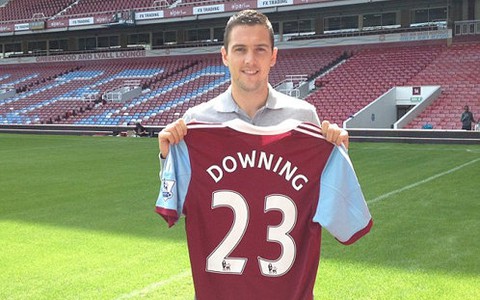In a move that has delighted Liverpool fans and evoked a wave of nostalgia, former winger Stewart Downing has officially rejoined the club in a new capacity as a global talent scout. Announced in May 2025, this surprise appointment marks a full-circle moment for the 40-year-old, who first graced Anfield’s pitch over a decade ago. No longer the fleet-footed player darting down the left flank, Downing now embarks on a behind-the-scenes role, scouring the world for the next generation of stars to don the famous red jersey.

Downing’s return comes at a time when Liverpool are undergoing a significant reshuffle in their coaching and recruitment staff. With the club fresh off another Premier League triumph, the emphasis on building a sustainable future through smart scouting has never been greater. As part of the recruitment team led by chief scout Barry Hunter, Downing will leverage his extensive playing experience to identify high-potential players via video analysis and on-the-ground evaluations. His role as a “global talent scout” involves recommending prospects to the wider team, focusing on those who embody the Liverpool ethos of relentless effort, unbreakable spirit, and unquenchable desire to succeed.
A Journey Rooted in Middlesbrough Humility
Stewart Downing’s footballing story begins in the industrial heartland of Middlesbrough, where he was born and raised. Emerging from the Teesside club’s academy, he made his senior debut in 2002 at just 17 years old. His early career was defined by raw talent and versatility, often deployed as a left midfielder or winger. Downing’s left foot became legendary for its precision in crosses and set-pieces, earning him a reputation as one of England’s most promising talents. By 2009, after helping Middlesbrough reach the UEFA Cup final in 2006, he secured a £12 million move to Aston Villa, where he continued to impress with his work rate and delivery.

It was during his time at Villa that Downing caught the eye of Liverpool’s then-manager, Kenny Dalglish. In the summer of 2011, the Reds splashed out £20 million to bring him to Anfield, a fee that reflected the high expectations placed on his shoulders. Downing arrived amid a wave of optimism, as Liverpool sought to rebuild after a turbulent period. Under Dalglish, he was tasked with providing width and creativity on the left flank, often linking up with the likes of Luis Suarez and Andy Carroll. His debut season saw moments of brilliance, including a memorable goal in the FA Cup semi-final against Everton, but consistency eluded him. Critics pointed to his adaptation struggles in a high-pressure environment, yet Downing’s quiet professionalism shone through.
Reflecting on that era, Downing has spoken about the invaluable lessons learned at Liverpool. “It was a dream to play for such a historic club,” he once noted in interviews. His two-year stint yielded 91 appearances, seven goals, and a League Cup triumph in 2012. However, the arrival of Brendan Rodgers signaled a shift in tactics, and Downing found himself on the periphery. In 2013, he departed for West Ham United in a £5 million deal, a move that many saw as underwhelming given his initial promise. Yet, this phase of his career was far from a downturn; it was a period of growth and resilience.
Trials and Triumphs Beyond Anfield
Post-Liverpool, Downing’s journey took him through a series of clubs that tested and honed his understanding of the game. At West Ham, under Sam Allardyce, he rediscovered form, contributing to the Hammers’ solid mid-table finishes with his trademark crosses and set-piece expertise. From 2013 to 2015, he made 79 appearances, scoring three goals and providing numerous assists. This spell reinforced his adaptability, as he transitioned from a pure winger to a more central role at times.

In 2015, Downing returned to his boyhood club, Middlesbrough, on a free transfer. This homecoming was poignant, allowing him to captain the side and lead them to promotion from the Championship in 2016. His leadership qualities emerged prominently, guiding younger players through the rigors of professional football. Middlesbrough’s brief Premier League stay in 2016-17 ended in relegation, but Downing’s commitment never wavered. He remained until 2019, amassing over 150 appearances in his second spell and cementing his status as a club legend.
The final chapter of his playing career unfolded at Blackburn Rovers, where he joined in 2019 at the age of 35. Despite his advancing years, Downing’s experience proved invaluable in the Championship. He played 76 games, scoring twice, before retiring in 2021. Throughout these later years, Downing’s off-field insights grew. He began mentoring academy prospects and engaging in scouting discussions, foreshadowing his current role. His path—from the glamour of Anfield to the grit of Championship battles—equipped him with a unique perspective on what makes a player thrive at Liverpool.
Downing’s experiences at Middlesbrough, West Ham, and Aston Villa weren’t just about accumulating caps; they were masterclasses in perseverance. At Villa, he navigated injuries and managerial changes, learning the importance of mental fortitude. West Ham taught him about tactical discipline in a pragmatic setup, while his Middlesbrough return emphasized community and loyalty. These elements align perfectly with Liverpool’s core values: effort, spirit, and hunger. As Downing himself has alluded, spotting talent isn’t just about skill—it’s about identifying those who will fight for the badge, much like he did during his own career highs and lows.
A New Chapter: Scouting the Future Stars
In his new role, Downing steps into Liverpool’s revamped recruitment structure, which has been bolstered by recent hires and a focus on data-driven decisions. The club advertised several scouting positions in late 2024, and Downing’s successful application underscores his deep connection to the Reds. Working remotely and traveling globally, he’ll analyze footage, attend matches, and network with agents to unearth “rough diamonds” who could become the next Mohamed Salah or Virgil van Dijk.
Liverpool’s scouting network has a storied history of success, from unearthing gems like Sadio Mane to nurturing homegrown talents such as Trent Alexander-Arnold. Downing’s addition brings a player’s-eye view to the table. Having played under iconic managers like Dalglish and Allardyce, he understands the nuances of fitting into a team dynamic. His global remit means venturing beyond Europe to emerging markets in Africa, South America, and Asia, where untapped potential abounds.
Fans have reacted warmly to the news, with social media buzzing about Downing’s return. One X post humorously noted, “From crossing balls to crossing continents—welcome back, Stewy!” Another highlighted his past contributions, recalling his pivotal role in the 2012 Carabao Cup win. This appointment also aligns with broader changes at the club, including departures like Vitor Matos to Marítimo and Pep Lijnders to Manchester City, signaling a fresh era under the current regime.
Welcome Home: Promises of a Bright Horizon
Stewart Downing’s return to Liverpool isn’t just a sentimental nod to the past; it’s a strategic move that promises to enrich the club’s future. From the silent wing wizard under Dalglish to a globe-trotting scout, his evolution mirrors the game’s own progression toward holistic development. The years spent at Middlesbrough, West Ham, and Aston Villa have forged him into someone who truly grasps the essence of a Liverpool player: unyielding effort, indomitable spirit, and an insatiable thirst for victory.
As Anfield welcomes back one of its own, the message is clear—a new chapter begins, not on the pitch but from the shadows, equally thrilling and full of potential. Welcome home, Stewart Downing. The Red Brigade awaits the fruits of your labor.Liverpool FC Addict





